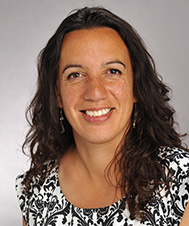 Tuesday 23 January 2018 1:30pm
Tuesday 23 January 2018 1:30pm
New research from the University of Otago School of Medicine uncovers a need for better strategies to increase public knowledge of cancer risk factors.
There are substantial gaps between expert recommendations and public knowledge about risk factors for cancer, though these gaps are closing for some cancer types, according to new University of Otago research.
The study, led by Dr Rose Richards of the Cancer Society Social and Behavioural Research Unit, interviewed over 1000 adults from across New Zealand, and compared these findings with a similar study done in 2001.

Dr Rose Richards.
In the recent survey, most people could identify risk factors for lung cancer and melanoma, but few could recall key risk factors for cervical, breast and bowel cancer.
A positive finding was that, despite being low, awareness for some cancer types had increased since 2001. More people could identify risk factors for bowel cancer (52.8% of the 2001 study were unable to identify any risk factors, compared to only 34.8% of the recent study), and awareness of breast cancer risk factors had increased among women.
“These gains in knowledge are important,” says Dr Richards.
“Cancer agencies are competing for attention in a crowded and contested health information environment, so it is great to see that some of these key messages are hitting home.”
The current New Zealand Cancer Plan includes a goal of increasing public awareness of cancer risk factors, and researchers believe that strategies to increase cancer literacy should be part of broader evidence-based public health programmes to support risk behaviour change.
“These findings show that there are still significant gaps in awareness which need to be addressed' says Dr Richards, “particularly for some types of cancer such as bowel, breast and cervical cancer.”
The study, funded by the Cancer Society of New Zealand and titled 'Knowledge of evidence-based cancer risk factors remains low among New Zealand adults: findings from two cross-sectional studies, 2001 and 2015”, was authored by Dr Rose Richards, Mrs Bronwen McNoe, Dr Ella Iosua, Associate Professor Anthony Reeder, Dr Richard Egan, Dr Louise Marsh, Miss Lindsay Robertson, Dr Brett Maclennan, Mrs Anna Dawson, Dr Robin Quigg, and Ms Anne-Cathrine Petersen. It is published in the Asian Pacific Journal of Cancer Prevention.
For more information, please contact:
Dr Rose Richards
Division of Health Sciences
University of Otago
Tel: +64 27 307 4054
Email: rose.richards@otago.ac.nz
A list of Otago experts available for media comment is available elsewhere on this website.
Electronic addresses (including email accounts, instant messaging services, or telephone accounts) published on this page are for the sole purpose of contact with the individuals concerned, in their capacity as officers, employees or students of the University of Otago, or their respective organisation. Publication of any such electronic address is not to be taken as consent to receive unsolicited commercial electronic messages by the address holder.
